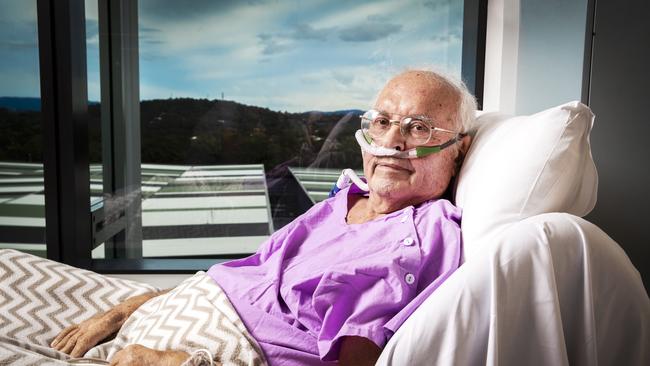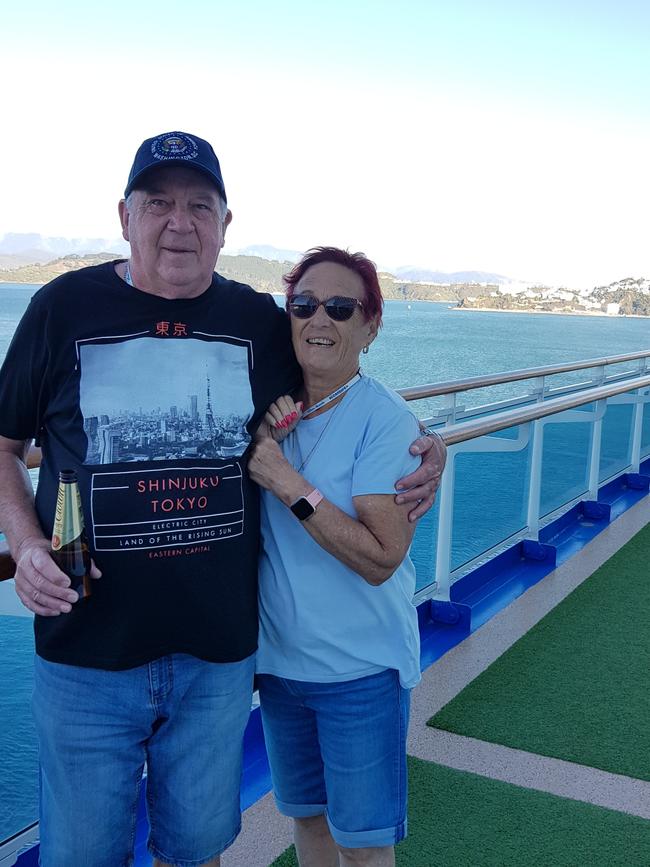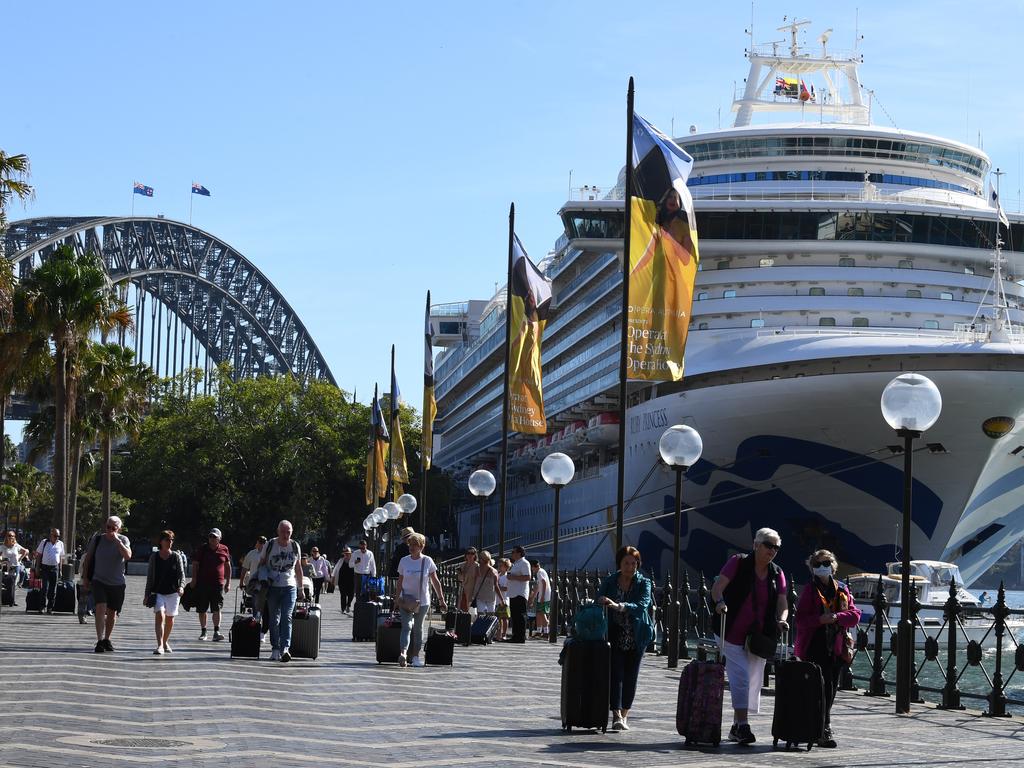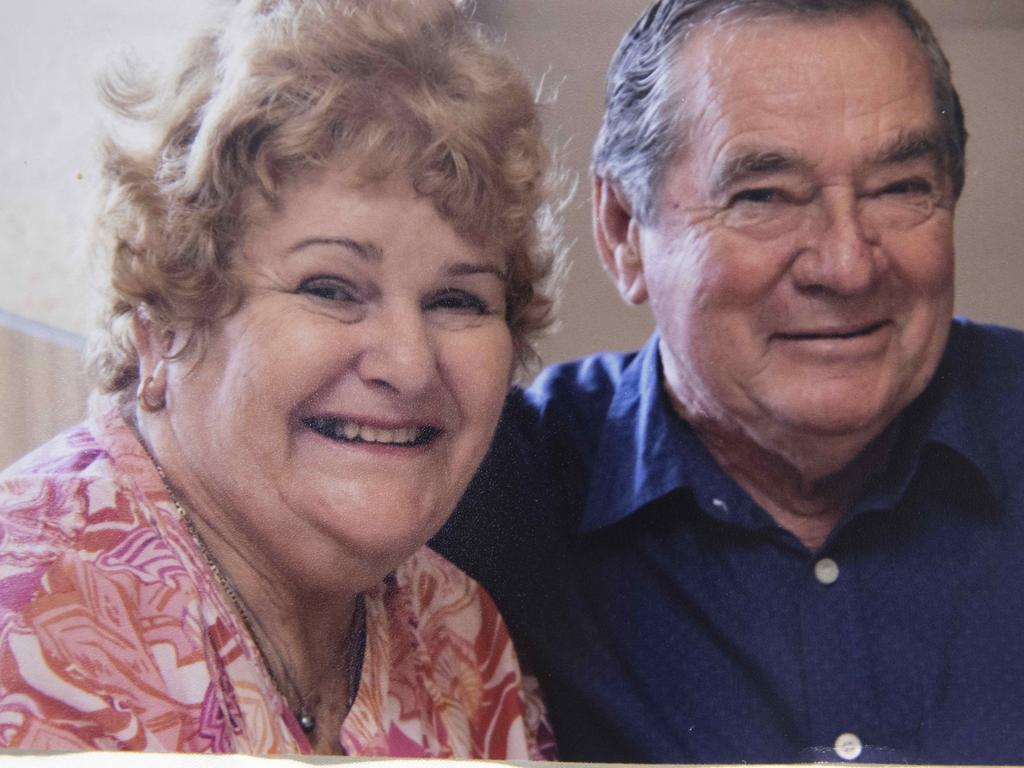Coronavirus: Ruby Princess fiasco ‘inexcusable’, inquiry finds
Officials committed a litany of ‘inexplicable, inexcusable’ failures before arrival of Ruby Princess cruise ship in Sydney Harbour.
Health officials committed a litany of “inexplicable and inexcusable” failures before the arrival of the Ruby Princess cruise ship in Sydney Harbour, ultimately leading to a public health emergency that could have been avoided.
A NSW Special Commission of Inquiry into the cruise ship fiasco has concluded that members of the NSW Health expert panel were largely to blame for the deadly consequence of allowing 2647 passengers to disembark from the vessel and disperse into the community without adequate checks for COVID-19.
In a raft of blunt and sometimes blistering conclusions, commissioner Bret Walker SC found the expert panel did not thoroughly analyse an acute respiratory disease log provided by the ship and did not apply the correct “suspect case” definition to unwell patients arriving at the ship’s medical centre.
Ruby Princess was granted entry to sail into Sydney on March 19, based on a “low risk” assessment handed down by NSW Health officials. Mr Walker found this assessment to be both “inexplicable” and “unjustifiable”.
“It was a serious mistake,” he wrote, one that ultimately paved the way for 2647 passengers to leave the ship and disperse through Sydney, sparking a public health emergency and a scramble to track secondary and tertiary infections.
More than 20 passengers subsequently died as a result of contracting the virus on board the ship and a further 700 infections were traceable to the outbreak on the cruise liner, which set sail on a 14-day round trip tour from Sydney to New Zealand on March 8. The trip was cut short and the vessel returned to Sydney early once Scott Morrison issued an edict to close the country’s borders.
The report laid the blame for the fiasco on NSW Health, effectively absolving the federal government’s Australian Border Force which it said did not bear “any responsibility for the Ruby Princess mishap’’.
Mr Walker’s 320-page report takes aim at a number of targets: the risk-assessment scale under which the ship was labelled “low risk” on arrival; sloppy communication between some state and federal agencies; and the legislated procedures around the granting of “pratique”, or permission to dock at a port.
Mr Walker saved some of his gravest concern for the extensive and “inexcusable” delay in the screening of 13 swabs taken off the ship upon its arrival in Sydney. While they were taken to a laboratory for COVID-19 testing, the inquiry heard the swabs were misidentified in a queue and not labelled a priority, delaying their results by more than 24 hours.
“The sooner test results were appreciated, the sooner the scattering could be pursued and contact tracing (and associated further testing) carried out,” the report said.
Graeme Lake took his wife Karla on the Ruby Princess for her 75th birthday. Within 24 hours of disembarking in Sydney, Mrs Lake was in a Queensland hospital struggling to breathe with COVID-19. Mr Lake fell ill days later and joined her in isolation in the same room. She died on the bed beside him.

“My life’s finished, I’m just stuck here now,” Mr Lake said on Friday. “And there’s a lot of families out there in the same predicament as me.”
The 72-year-old spoke to the Ruby Princess inquiry via video link for 45 minutes. The Vietnam veteran had experienced first hand the ineptitude of NSW Health.
“I was out of hospital. My wife had passed away four or five days previously and they rang me up to ask whether my wife and I were still self-isolating,” he said.
Mr Walker’s report stops short of making any hard recommendations for changes to legal frameworks, processes or departmental procedures.
There were, he wrote, “no systemic failures” to address the crisis that occurred.
“The mistakes and failures in decision-making here have, to a large extent, been recognised by the physicians of the expert panel, and by NSW Health more broadly,” the report said.
“It is inappropriate and unhelpful to make recommendations to experts that in truth amount to no more than ‘do your job’. Put simply, despite the best efforts of all, some serious mistakes were made.”
The inquiry heard that the expert panel was provided with an outdated copy of the ship’s patient log to make its assessment and only one member of the panel, Mark Ferson, was given a copy. Professor Ferson told the inquiry he read through the report in something of a rush, and did not register with alarm that an accelerating number of passengers were presenting to the ship’s medical centre with illnesses. This, he told the inquiry, was relatively common on cruise ships.
“No less than half of the passengers and crew on that log had presented during the course of a single day,” Mr Walker noted. “It was a serious failure not to recognise this rise in the level of illness, and to consider what it might have meant. Such consideration would, it is likely, have resulted in the expert panel elevating its risk assessment for that reason alone.”

Where mistakes were made, Mr Walker provides some suggestions for improvement. On his account, had every agency worked according to protocol, the ship would not have been graded a “low risk” and the precautionary swabs of 13 passengers would have been tested immediately upon the ship’s arrival in Sydney. From there, a NSW Health assessment team would have boarded the vessel and swabbed passengers suspected of carrying the virus.
Mr Walker found that all passengers and crew should have been considered suspect cases for the virus, regardless of their symptoms, and that they should have been kept on board – despite the risk of potential further transmission – until the testing results were clear.
Only then, Mr Walker noted, should pratique have been granted to the ship, subject to full quarantine procedures being adhered to by all passengers.
“Ultimately, every passenger and crew member of the Ruby Princess should have been tested for COVID-19 while in enforced quarantine. Those who tested negative could then have been released, at appropriate times,” the report said.
The Australian Border Force was largely absolved of any blame for the debacle.
The report noted: “Given its lack of medical or epidemiological expertise, it is well for the public good that the ABF (and, for that matter, the Department of Home Affairs) do not bear any responsibility for the Ruby Princess mishap.
“As this report was being finished, some interesting journalism was published that advanced the notion that a basic misreading by an ABF officer of negative influenza results as meaning negative COVID-19 results, had somehow contributed to the decision to let the passengers go as they did on 19 March.
“As the body of the report spells out, that is not correct. It was the state’s expert panel that made the operative decision, relayed accurately (if by a clumsy means) to the DAWE Biosecurity Officer who granted pratique.”
Mr Walker also defended his decision not to call NSW Health Minister Brad Hazzard to appear before the inquiry.
NSW Labor had called for Mr Hazzard to resign in the weeks after the cruise ship catastrophe.
“Of course a minister should resign in some circumstances, but as this commission sees it, without wading into the partisan politics, this case would not appear to fit that outcome,” Mr Walker wrote.
“The failures were professional – failures in decision-making by experts. They are not, as to their expert judgments, subject to ministerial direction. Nor should they be, unless our system of government were to become farcical.”
Princess Cruises, the owner of the Ruby Princess, issued a statement following the release of the inquiry’s report, saying it effectively exonerated all staff on board. One finding made against the company included that it should have ensured the ship’s doctor was made aware of updates to the definition of a COVID-19 “suspect case”, and that passengers and crew should have been informed of such cases on board.
“The Commission’s report confirms that none of our people – the captain, the ship’s doctor, or members of our shore side port agency team – misled the public authorities,” it said. “This finding is of great importance to us because it goes to the integrity of our people.
“We acknowledge the Commission’s specific comments about Carnival and we will consider these comments to the fullest possible extent.”
NSW Premier Gladys Berejiklian said she had released the report as soon as it was received by the NSW government and that she would now spend the weekend reviewing the findings.






To join the conversation, please log in. Don't have an account? Register
Join the conversation, you are commenting as Logout